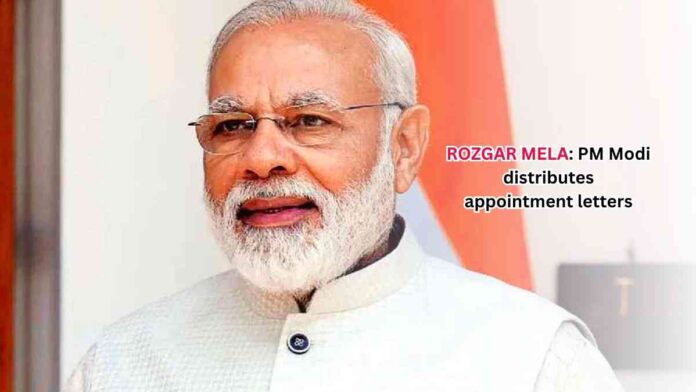According to the Congress, Prime Minister Narendra Modi has been accused of ruining governance and orchestrating “Rozgar Melas” to give the impression that he is personally providing employment opportunities to young people. This statement was made by the Congress on Tuesday.
In the latest Rozgar Mela held on Tuesday, Prime Minister Modi virtually distributed a staggering 71,000 appointment letters. Meanwhile, several ministers were dispatched to 45 different locations across the country to physically distribute the letters on behalf of the Prime Minister. In the capital, a cutout of Prime Minister Modi was set up to allow new recruits to take photographs while holding a “Rozgar Mela” placard that prominently displayed the Prime Minister’s name.
As part of the government’s pledge to create 1 million jobs within the next 12 months, a series of events were orchestrated. Congress has questioned the significance of providing 1 million jobs as an accomplishment.
According to Jairam Ramesh, the Congress communications chief, the Prime Minister has destroyed governance by personalizing it like never before. Through his Rozgar Melas, he has taken it to new lows, creating an impression that he is the sole creator of these jobs and personally responsible for paying those who get employed. This has led to a sense of indebtedness among the beneficiaries towards him.
According to Ramesh, the youth in the country who are seeking employment are aware that the Prime Minister is responsible for the loss of numerous jobs in both the government and private sectors. Ramesh attributes this to the effects of demonetisation, a flawed GST system, the weakening of MSMEs, and the widespread privatisation of PSUs.
According to Congress President Mallikarjun Kharge, Prime Minister Narendra Modi has shattered the aspirations of 180 million young people by failing to deliver on his promise of generating two million jobs annually over the past nine years. Despite the existence of 30 lakh vacancies within the government, the Prime Minister recently chose to make a grand spectacle out of the distribution of a mere 71,000 appointment letters. According to sources, the Congress has vowed to deliver a suitable response to what they perceive as a betrayal of the nation’s youth by the Modi administration.
The Rozgar Melas, where the Prime Minister and his cabinet colleagues distribute appointment letters to selected candidates, have come under criticism from Congress. The Congress party has leveled accusations against Prime Minister Modi, claiming that he is exaggerating the significance of regular recruitments in order to mask the issue of unemployment that has persisted during his tenure.
Following a previous Rozgar Mela, Congress leader Shaktisinh Gohil had requested for the names, phone numbers, and departments of the 75,000 beneficiaries who were claimed to have been given jobs. A dedicated website is to be created and the information will be made public. The Prime Minister’s Rozgar Mela provides transparency in job allocation as anyone can verify the list of job recipients.
The journalist asked if jobs were actually provided to these individuals. Have they been hired on contract, or is there more to the story? What procedures were followed in the selection of these candidates? The public demands transparency regarding the distribution of jobs. It is imperative that the authorities disclose to whom and how these positions were allocated. Can you also provide information on the duration of the vacancy of these posts?
Last year, Pawan Khera, a Congress spokesperson, made a statement regarding the job crisis, stating that it had gone unnoticed until the sudden organization of the Rozgar Mela. The Prime Minister has been noted for his ability to turn crises into spectacles. During the Covid pandemic, a spectacle was witnessed by us. According to his guru L.K. Advani, Modi was referred to as an event manager.
On Tuesday, Modi declared that every policy created in the past nine years has served as a gateway to producing employment opportunities for the younger generation.
A wide range of positions will be filled by newly recruited personnel, according to recent reports. These roles include gramin dak sevaks, inspectors of posts, commercial-cum-ticket clerks, junior clerks-cum-typists, junior accounts clerks, track maintainers, assistant section officers, lower division clerks, sub-divisional officers, tax assistants, assistant enforcement officers, inspectors, nursing officers, assistant security officers, firemen, assistant accounts officers, assistant audit officers, divisional accountants, auditors, constables, head constables, assistant commandants, principals, trained graduate teachers, assistant registrars, and assistant professors, among others.



